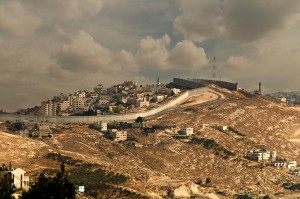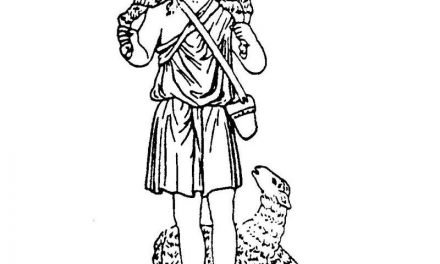Micah 5:1-4a
Psalm 80:2-3, 15-16, 18-19
Hebrews 10:5-10
Luke 1:39-45
As the United States continues to reel from the recent massacre in Connecticut, the lectionary readings this Sunday invite us to consider the theme of peace. The first reading ends with a line that at first glance might seem overly definitive or even naïve: a future ruler of Israel, coming forth from the tiny hamlet of Bethlehem, shall be our peace. The reading makes an identification where at most what seems called for is an association. Micah does not say, for instance, that “he will establish peace” or that “peace will result from his rule,” but simply that “he will be our peace.” One could debate the semantic details here, of course, but the rendering in English at least invites the question of what the meaning of “peace” is in this prophetic-messianic context.
The simplest definition of peace, of course, is the absence of violence. Yet the Judeo-Christian tradition has never been content with this minimal description. As the Compendium of the Social Doctrine of the Church reminds us:
In biblical revelation, peace is much more than the simple absence of war; it represents the fullness of life (cf. Mal 2:5). Far from being the work of human hands, it is one of the greatest gifts that God offers to all men and women, and it involves obedience to the divine plan. Peace is the effect of the blessing that God bestows upon his people (CSDC §481).
In short, peace and violence are social expressions of human beings’ relationship to the Creator God. The entire history of salvation, in fact, can be reduced to God’s ongoing attempt to reestablish the peace that has been lost through human sinfulness. One reason why God performs this work through a people rather than through each person individually is that what He is ultimately trying to bring about is a corporate reality which must be shared in order to be fully realized.
Even between particular individuals, true peace can never be unilaterally imposed. That kind of “peace” is simply another form of violence. In this regard, I cannot help but think of my own experience of Bethlehem in the summer of 2011. Driving out of Jerusalem, one begins to see within minutes the truly imposing “separation wall” that serves as a buffer between Israeli and Palestinian controlled territory. Our Israeli tour guide cheerily explained to us how this 8-meter-high (26 ft.) wall has resulted in a dramatic decrease in terrorist violence at the hands of the Palestinians. True as that may be, has it really brought “peace” in any meaningful sense? I could not help but find the sight of Bethlehem surrounded by this enormous wall both deeply ironic and deeply distressing. Unlike the ancient walls of Jerusalem, it was not built to keep people out, but rather to keep people in. The price of peace in this instance is to barricade the birthplace of the Prince of Peace.
As it was that blessed night when our Lord was born under the open air, the world today is too consumed with achieving and maintaining its own security to attend to the radically insecure ways in which God works to establish peace in our midst.
It was Tacitus who said of his own people that “they make a desert and call it peace.” In our own day, I often feel as though we do the same, except instead of “peace” we call our deserts “security.” It is a remarkable irony of history that only after the Church found its “peace” with the Empire that many of its members began to flee to the desert to find true peace. Like so many before them, including Jesus himself, the disciples and spiritual descendants of St. Antony found a fullness of life in the desert which no other locale on earth could offer. They went to the desert and discovered the true meaning of peace. The key to this peace, however, is the patient anticipation and obedient acceptance of a gift that one cannot give one’s self.
The desire for peace is good and natural in the wake of the appalling violence our nation has experienced this Advent season. Yet we Christians must remember that, insofar as Christ himself is our peace, we cannot establish true peace by our own willful determination or our own strategic efforts, no matter creative they are.
Among the countless responses to the Newtown tragedy which have appeared in the media, the one that resonated most with me came from Connecticut governor Dan Malloy. Like so many, he expressed his own deep grief and anger at what happened, and he even flatly remarked—when repeatedly prompted—that the federal government should reenact the Brady Bill. Yet what made his comments stand out to me was a willingness to look at the particular event in its social dimension and simply describe it. Too often our descriptions of the violence around us already contain an implication of our proposed response to that violence. For example, when one says “this has happened too many times,” are they not also simultaneously saying “and I’m gonna to put a stop to it”? Understandably, we want to rush in to “fix” the situation, but as for me I though Gov. Malloy’s response the most appropriate. His meager contribution to the maelstrom of soundbytes was was simply to say that “we are a violent society.” It does not deny the grief we all feel, but it also mixes that grief with the repentance I believe appropriate to our own participation in the society which has produced such an act. It carries the weight of a confession of an addict long in denial, and the power of an acknowledgement that one has tried to evade by every means possible. Our children have been claimed by the violence we have made possible. Let us simply recognize that fact, and grieve, and repent. Tighter gun controls cannot undo what has been done; we cannot fix this tragedy with politics. Nothing can be done now to restore to us the children which have been claimed by this violence.
Like Israel with her sin offerings and holocausts, we think there is some concrete act which we can perform in the short-to-middle term that can establish the peace for which we so long. In the case of the murdered Sandy Hook children, part of the impetus toward new gun legislation is doubtless borne out of the desire to ensure that something good and meaningful come out of their deaths. Yet no matter how needed or prudent increased gun control may be, any moment’s thought reveals how utterly inane and even blasphemous that kind of theodicy appears in the face of such enormous loss. The future security of my own children does nothing to diminish or explain the violence which has been endured and will continue to be endured by those who loved those children who were lost.
Peace is not going to come merely from our own attempt to control the weapons of war, to install more effective security apparatuses, or to build more resistant security barriers. If the narrative of our Lord’s nativity teaches us anything, it teaches us that we can neither simply impose peace nor strategize a path to its inevitable achievement. Peace is something we must receive. Peace comes not from any Archimedean “eureka” but only from the Marian “fiat.” The peace that is born into the world at Christmas is not even something which was ultimately determined by mere Davidic inheritance alone, since it is only in virtue of Mary’s virginal betrothal that such a connection can be made. Peace appears unexpectedly, in the womb of the peasant girl with the forgotten genealogy. Let us not forget that only her blood runs through Jesus’ veins.
Peace comes to us not through any technocratic mechanism, but rather in the person of Christ, who dwells in the poor and vulnerable among us just as much as He dwelt in the body of Mary standing before Elizabeth. May the Holy Spirit fill us when we encounter Him among us, that the image we ourselves bear of Him might awaken and dance within us. Let us look to the many deserts which our own craving for security has created and repent of our feverish attempts to control history and make it “turn out right.” May we return again to the cave at Bethlehem and kneel before the Prince of Peace, offering Him the gifts which we have received from His own hand. The animals and the cold night air make it clear that He cannot ultimately offer us security, but the bright star above makes it equally clear that he can offer us the peace for which we yearn.




